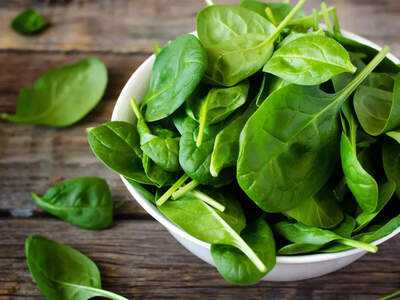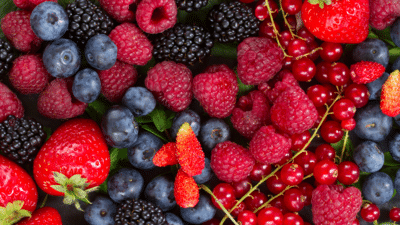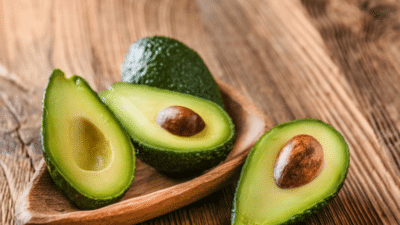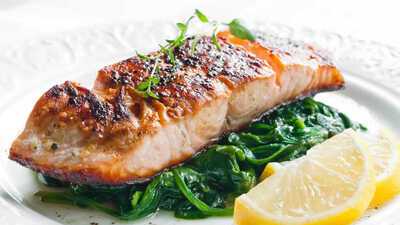About 17.9 million die each year due to cardiovascular diseases (CVDs) every year. CVDs are the leading cause of death globally, according to the WHO. Maintaining heart health is crucial, and diet plays a pivotal role in it. Here is a list of foods that can improve your heart health.
Leafy greens

Eat your greens. Yes, that's right. Leafy greens such as spinach, kale, and Swiss chard are nutritional powerhouses. They are an excellent source of vitamin K, which helps protect arteries and promote proper blood clotting. A recent study from Edith Cowan University (ECU), the University of Western Australia, and the Danish Cancer Institute has shown that a cup and a half of leafy green vegetables could go a long way to addressing atherosclerotic vascular diseases (ASVD’s). The study found that higher dietary intake of Vitamin K1 can reduce the risk of ASVD. “Leafy green and cruciferous vegetables, like spinach, kale, and broccoli, contain Vitamin K,1 which may assist in preventing vascular calcification processes that characterise cardiovascular disease. The great news is that these vegetables can be easily incorporated into your daily meals,” the lead researcher said.
Whole grains

Refined grains are your heart's biggest enemy. Instead, switch to whole grains, such as oats, quinoa, brown rice, and whole wheat. They are high in fiber, which helps reduce cholesterol and maintain healthy blood sugar levels. A 2021 study showed that eating more refined grains increases the risk of major cardiovascular disease, such as heart attack, stroke, and even death. Whole grains, on the other hand, are linked to a lower risk of heart disease.
Berries

Who knew eating something as sumptuous as berries could actually boost your heart health! These include blueberries, strawberries, and raspberries. They contain flavonoids, which can lower blood pressure and reduce oxidative stress. A 2019 study by researchers at the University of East Anglia found that eating a cup of blueberries a day reduces risk factors for cardiovascular disease.
"Previous studies have indicated that people who regularly eat blueberries have a reduced risk of developing conditions, including type 2 diabetes and cardiovascular disease. This may be because blueberries are high in naturally occurring compounds called anthocyanins, which are the flavonoids responsible for the red and blue colour in fruits. We found that eating one cup of blueberries per day resulted in sustained improvements in vascular function and arterial stiffness - making enough of a difference to reduce the risk of cardiovascular disease by between 12 and 15 per cent," the researchers of the study said.
Avocados

Yes, the creamy green fruit can not only bless your taste buds, but also boost your heart health. They are rich in monounsaturated fats, which can help lower 'bad' LDL cholesterol and increase 'good' HDL cholesterol. A 2022 study published in the Journal of the American Heart Association found that eating two or more servings of avocado weekly was associated with a lower risk of cardiovascular disease. The participants in the study, who ate at least two servings of avocado each week, had a 16% lower risk of cardiovascular disease and a 21% lower risk of coronary heart disease, compared to those who never or rarely ate avocado.
Video
Fatty fish

Another way to enhance your heart health is to add more fatty fish to your diet. Fatty fish, such as salmon, mackerel, sardines, and trout, are rich in omega-3 fatty acids eicosapentaenoic acid (EPA) and docosahexaenoic acid (DHA), which have been shown to reduce inflammation and improve overall heart health. A 2023 study by researchers from Karolinska Institute found that the risk of CVDs can be reduced by eating more fatty fish. People with close relatives who have suffered from cardiovascular disease may also benefit from eating more oily fish.
Leafy greens
Eat your greens. Yes, that's right. Leafy greens such as spinach, kale, and Swiss chard are nutritional powerhouses. They are an excellent source of vitamin K, which helps protect arteries and promote proper blood clotting. A recent study from Edith Cowan University (ECU), the University of Western Australia, and the Danish Cancer Institute has shown that a cup and a half of leafy green vegetables could go a long way to addressing atherosclerotic vascular diseases (ASVD’s). The study found that higher dietary intake of Vitamin K1 can reduce the risk of ASVD. “Leafy green and cruciferous vegetables, like spinach, kale, and broccoli, contain Vitamin K,1 which may assist in preventing vascular calcification processes that characterise cardiovascular disease. The great news is that these vegetables can be easily incorporated into your daily meals,” the lead researcher said.
Whole grains

Refined grains are your heart's biggest enemy. Instead, switch to whole grains, such as oats, quinoa, brown rice, and whole wheat. They are high in fiber, which helps reduce cholesterol and maintain healthy blood sugar levels. A 2021 study showed that eating more refined grains increases the risk of major cardiovascular disease, such as heart attack, stroke, and even death. Whole grains, on the other hand, are linked to a lower risk of heart disease.
Berries
Who knew eating something as sumptuous as berries could actually boost your heart health! These include blueberries, strawberries, and raspberries. They contain flavonoids, which can lower blood pressure and reduce oxidative stress. A 2019 study by researchers at the University of East Anglia found that eating a cup of blueberries a day reduces risk factors for cardiovascular disease.
"Previous studies have indicated that people who regularly eat blueberries have a reduced risk of developing conditions, including type 2 diabetes and cardiovascular disease. This may be because blueberries are high in naturally occurring compounds called anthocyanins, which are the flavonoids responsible for the red and blue colour in fruits. We found that eating one cup of blueberries per day resulted in sustained improvements in vascular function and arterial stiffness - making enough of a difference to reduce the risk of cardiovascular disease by between 12 and 15 per cent," the researchers of the study said.
Avocados
Yes, the creamy green fruit can not only bless your taste buds, but also boost your heart health. They are rich in monounsaturated fats, which can help lower 'bad' LDL cholesterol and increase 'good' HDL cholesterol. A 2022 study published in the Journal of the American Heart Association found that eating two or more servings of avocado weekly was associated with a lower risk of cardiovascular disease. The participants in the study, who ate at least two servings of avocado each week, had a 16% lower risk of cardiovascular disease and a 21% lower risk of coronary heart disease, compared to those who never or rarely ate avocado.
Video
Fatty fish
Another way to enhance your heart health is to add more fatty fish to your diet. Fatty fish, such as salmon, mackerel, sardines, and trout, are rich in omega-3 fatty acids eicosapentaenoic acid (EPA) and docosahexaenoic acid (DHA), which have been shown to reduce inflammation and improve overall heart health. A 2023 study by researchers from Karolinska Institute found that the risk of CVDs can be reduced by eating more fatty fish. People with close relatives who have suffered from cardiovascular disease may also benefit from eating more oily fish.
You may also like

Mumbai rains: Heavy downpour floods streets, railway tracks flooded, red alert sounded; watch

UK's best Bangladeshi restaurant named and it's in a little seaside town

Omelettes will come out 'fabulous' if you add 1 unusual step after frying

'I'm having too much fun to retire!': Aussie screen legend's new lease of life

David Dickinson's golden rule for fans on hunt for bargains






